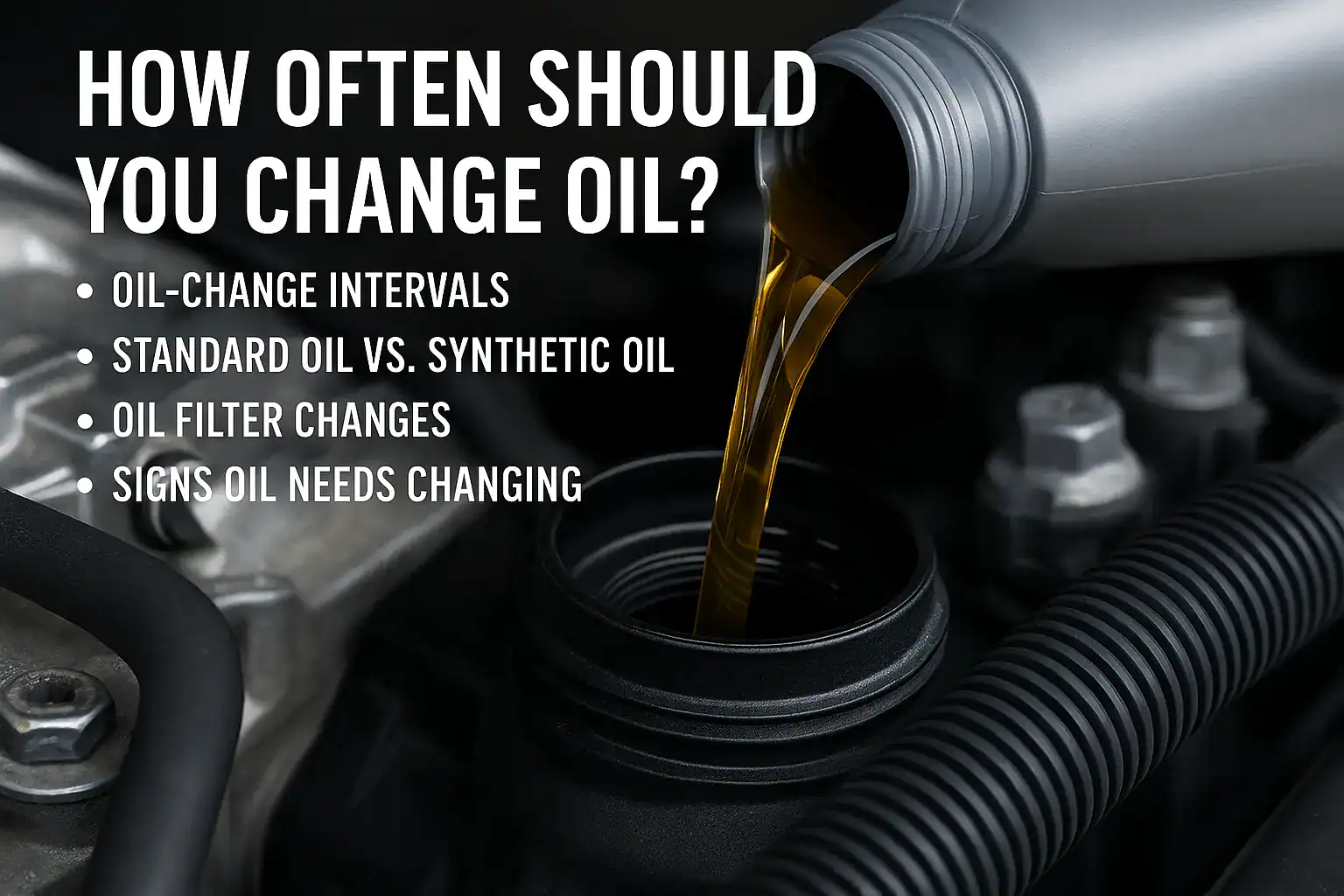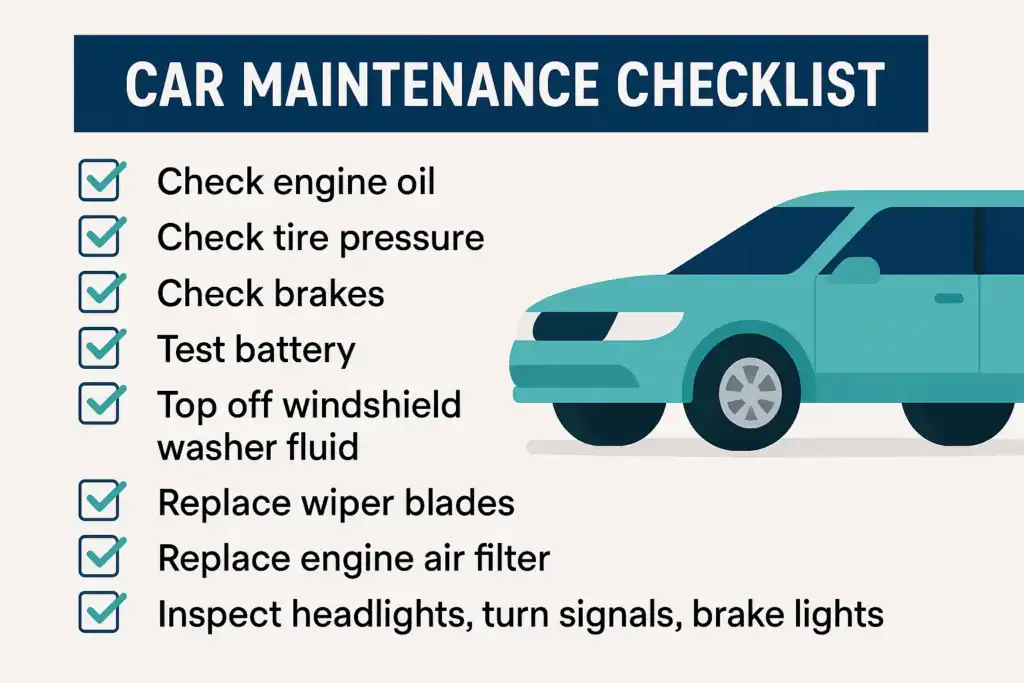
Changing your car’s oil is one of the simplest, cheapest ways to keep your engine healthy — but how often should you actually do it? Depending on who you ask, you’ll hear everything from every 3,000 miles to once a year. The real answer depends on your vehicle, your driving habits, and the type of oil you use.
In this guide, we’ll break down everything you need to know about oil change intervals — including signs your engine oil is wearing out, how synthetic oils compare to standard oils, and what happens if you wait too long.
Why Regular Oil Changes Matter
Engine oil plays a critical role in keeping your vehicle running smoothly. It lubricates the moving parts, reduces friction, prevents overheating, and helps flush out contaminants. But oil doesn’t last forever — over time, it breaks down and loses its effectiveness due to heat, dirt, pressure, and engine wear.
Delaying an oil change can lead to:
- Poor engine performance
- Reduced fuel efficiency
- Permanent engine damage
- Voided warranties
That’s why understanding your recommended oil-change intervals is key to avoiding major repairs later.
How Often to Change Oil: General Guidelines
There’s no one-size-fits-all number, but here are standard oil-change intervals based on oil type:
| Oil Type | Recommended Interval |
| Standard Oil (Conventional) | Every 4,000–5,000 km or 3–4 months |
| Synthetic Blend Oil | Every 6,000–8,000 km or 4–6 months |
| Full Synthetic Oil | Every 8,000–12,000 km or 6–12 months |
That said, always check your vehicle manual or oil-life monitor (if you have one), as some modern cars with carmaker-approved extended-life oils can go even longer between changes.
What Affects Your Oil-Change Schedule?
Your driving conditions and habits affect how long your engine oil lasts. You may need more frequent changes if you:
- Drive mostly short trips (under 15 minutes)
- Frequently idle in traffic
- Drive in extreme cold or heat
- Tow or carry heavy loads
- Use older engines with higher mileage
Even the oil chemistry matters — while petroleum-based oil breaks down faster, synthetic oils offer more stability under heat and pressure.
Signs It’s Time to Change Your Oil
Not sure if it’s time for your next engine oil change? Watch for these warning signs:
- Oil-pressure warning light comes on
- Oil level looks low or dirty on the dipstick
- Engine feels sluggish or noisy
- You smell burning oil
- You’ve hit the km/month threshold from your last change
Some vehicles have an oil-life monitor that calculates oil condition based on driving patterns. Still, it’s wise to check visually or ask your mechanic during regular maintenance.
Oil Filters: Small Part, Big Job
Changing your oil but skipping the oil filter is like brushing your teeth and not rinsing. A clogged or dirty factory oil filter can reduce oil pressure and lead to engine damage.
That’s why a full oil-filter change is always recommended with every standard oil change. Modern oil filters trap contaminants that would otherwise circulate through your engine oils and cause wear.
Conventional vs. Synthetic: What’s the Difference?
Standard oils (conventional) are refined from crude oil, while synthetic oils are engineered to provide better protection, resist breakdown, and last longer.
Here’s a quick breakdown:
- Standard oil: Cheaper, but breaks down faster under heat
- Synthetic oil: Longer-lasting, better high-temp stability, ideal for stop-and-go driving
- Synthetic blend: A middle ground that offers better performance than conventional
Depending on your vehicle and usage, upgrading to synthetic could mean fewer oil changes and better engine longevity.
Can You Wait Too Long Between Oil Changes?
Yes — and the cost isn’t worth it.
Delaying oil service can lead to sludge buildup, low pressure, overheating, and total engine failure. Even if your oil monitor isn’t alerting you, neglecting your oil needs increases long-term damage risks. If you’ve gone past 12,000-mile changes, it’s time to book a check-up, fast.
Pro Tips to Keep Your Oil in Check
- Check your oil once a month (dipstick check is easy!)
- Stick to carmaker-approved change intervals
- Watch for seasonal needs — extreme weather can stress oil
- Ask about oil change specials at your local shop
- Use only quality oil-change businesses with certified techs
Some drivers even prefer to bring their own oil to an oil-change place for peace of mind on oil quality and brand choice.
Final Thoughts: Stay Ahead of the Oil Curve
Knowing how often to change oil isn’t just about following rules — it’s about protecting your vehicle and saving money in the long run. Whether you’re running on standard oil, synthetic oil, or somewhere in between, make oil maintenance part of your car care routine.
Need help keeping up with your changing oil schedule in Cambridge, ON? Book a fast oil change with us and keep your engine running clean and strong.



